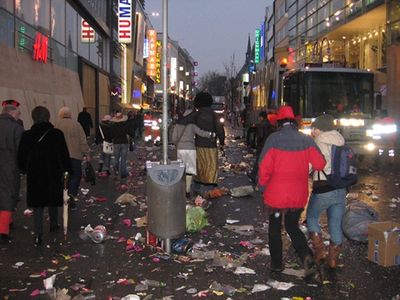Kiss Me, I'm German! (Karneval)
by Stephanie Devine
"Bützje!" was all I heard before I felt two burly hands grip either side of my face and pull me in for a kiss. Contrary to proper kissing etiquette, my eyes were wide open with shock as it was not everyday a middle-aged German man in a schoolgirl costume would demand the attention of my lips. He looked surprisingly familiar and it took me a moment to recognize him as the man who rode my very same trolley every morning. Of course, those mornings he usually wore a brown, tweed suite and a stach glare while ignoring my zesty smiles of salutations, and today . . .well, today he was Britney Spears.
I guess it was appropriate, however, considering there's no time like Karneval time for Germans to act as -German as possible. Often regarded as The Fifth Season, Karneval (or Fasching) is an annual five-day celebratory explosion in Deutschland, coterbalancing the traditionally rigid, Germanic way of life with a jam-packed festival of splendid debauchery. Those who are quiet are suddenly loud, the sober are suddenly drk, and the prudes are suddenly very flirtatious, supporting the rumor that November, nine months after Karneval, holds the record for Germany's highest birthrate.
Though I was not procreating, nor had I ever had problems coming out of my shell, I was thrilled to take part in festivities so glorified by those of native personages. Though tourists seem to be rapturous with the Germany's Oktoberfest, indigenous Rhinelanders swear that Karneval takes the cake with regards to intense drinking and grandiose costumes. Travelers flocking to Mich and Berlin at this time will never know the excitement taking place in Rein-adjacent cities such as Aachen, Bonn, Dusseldorf, Mainz and most famously, Cologne, excitement involving flamboyant parades, people calling out "Kamelle!" for free candy that flies through the air like confetti, and loudly sg celebratory Karneval songs like "Viva Colonia." They will miss costumes of every size and color, women cutting off all ties worn by men, and of course the bützje, a Karneval kiss.
While the land of Beethoven and bratwursts officially begins this major holiday on elften elften elf Uhr elf (November 11, 11:11am) the actual celebration commences sometime in February or early March, just before Lent. Though much like the masks celebrators wear in light of the holiday, the idea of Karneval as a pre-Ash Wednesday celebration is simply a thin, Christian façade of its original Pagan roots, roots that heartened Narren, or fools, to trick and chase away the bad sprits of winter. And considering the closest thing I fod to a Christian icon during this time was a woman dressed up as a pregnant n, I would say the holiday had stayed more true to its original foders.
Karneval is a holiday/season/crazy-loud-celebration not to be missed. If you're even just a day late, you'll find yourself walking quiet, empty, and abnormally clean streets where people are hesitant to give you the time of day. So buy your ticket and your soon-to-be-destroyed costume now. And who knows? Maybe you, too, will find yourself with a drk, cross-dressing German latched onto your mouth.
Featured Articles
by Trevor Payne There was really no point in going to bed. We would be setting off for a midnight trek in several hours anyways.
by Stephanie Devine "Bützje!" was all I heard before I felt two burly hands grip either side of my face and pull me in for a kiss.
By Courtney Price. “Ei aeg meest oota,” says a smiling Estonian face. (Time doesn’t wait for man,) so you better...
By Nada Jaksic. Ten years had passed since I last watched its palms sway in the mild warm breeze. A decade had drifted since...
Free Backpacking Europe Planning & Essentials Guide
Download/More info on the Backpacking Planning and Essentials Guide
Featured Articles
by Trevor Payne There was really no point in going to bed. We would be setting off for a midnight trek in several hours anyways.
by Stephanie Devine "Bützje!" was all I heard before I felt two burly hands grip either side of my face and pull me in for a kiss.
By Courtney Price. “Ei aeg meest oota,” says a smiling Estonian face. (Time doesn’t wait for man,) so you better...
By Nada Jaksic. Ten years had passed since I last watched its palms sway in the mild warm breeze. A decade had drifted since...
Free Backpacking Europe Planning & Essentials Guide
Download/More info on the Backpacking Planning and Essentials Guide






